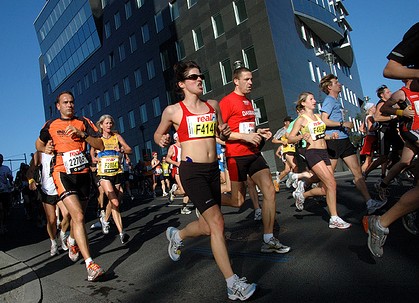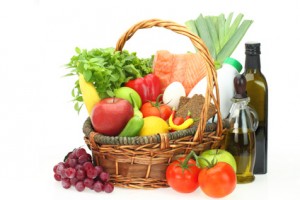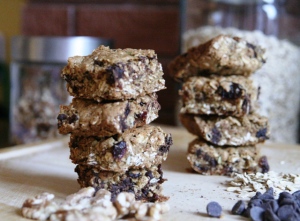This week, read about how to fuel for a faster marathon, more reasons to eat Mediterranean style, the health benefits of oats, Halloween candy to fuel training, and more.
Want to Run a Fast Marathon? Make Sure You Fuel it Right with Carbs!
 Many athletes don’t consume enough carbohydrates in training and racing, despite a significant body of research showing that consuming carbohydrates during endurance events leads to better performances. Endurance or intensity sessions deplete muscles of glycogen, so it’s important to consume carbohydrates to delay the onset of fatigue and replenish these stores.
Many athletes don’t consume enough carbohydrates in training and racing, despite a significant body of research showing that consuming carbohydrates during endurance events leads to better performances. Endurance or intensity sessions deplete muscles of glycogen, so it’s important to consume carbohydrates to delay the onset of fatigue and replenish these stores.
The New York Times reports this week on a study showing that proper timing and dosage of sports gels during a marathon led to better performances than a group who used their usual nutrition strategies. The “gel” group consumed more carbohydrates during the marathon than the “usual” group, which supports other research showing that optimal carbohydrate consumption improves performance. Of note, the gel group didn’t experience more gastrointestinal distress than the usual group, and practiced this fueling strategy during training – something many athletes neglect do do. Research shows that you can train your gut to tolerate and increase its ability to absorb carbohydrates . . . don’t wait until race day!
 More Reasons to Eat a Mediterranean-Style Diet
More Reasons to Eat a Mediterranean-Style Diet
Two new studies out this week add to the growing body of research showing that eating a Mediterranean style diet is good for your health.
One study, published in the American Heart Association’s journal Stroke, updates recommendations for stroke prevention, and recommends a Mediterranean-style diet; another study showed that eating a Mediterranean-style diet could reduce the risk of kidney disease.
What is a Mediterranean-style diet? A Mediterranean diet typically focuses on plant-based foods like vegetables, fruits, and whole grains; healthy fats from nuts, seeds, and olive oil; moderate intake of fish and poultry, and low intake of dairy products, red meat, processed meats, and sweets.
A Mediterranean-style eating plan can include many delicious foods, is not restrictive, and an extensive body of research links eating “Mediterranean-style” to numerous health benefits.
The Health Benefits of Oats
 This week I discovered that there is an International Oat Day. Oats are certainly a dietary staple for me: a typical breakfast includes oatmeal and fruit or muesli, and I usually incorporate oats into other foods and baked goods. As an endurance athlete, my diet is typically high in carbohydrates, and oats are an inexpensive, healthful, and versatile source of carbohydrates to fuel my activity. Also out this week was a journal supplement dedicated to a scientific review of oats (summary is here; and you’ll find all the articles in the October 2014 supplement of the British Journal of Nutrition October ). Among other topics, the supplement reviews research, including the following:
This week I discovered that there is an International Oat Day. Oats are certainly a dietary staple for me: a typical breakfast includes oatmeal and fruit or muesli, and I usually incorporate oats into other foods and baked goods. As an endurance athlete, my diet is typically high in carbohydrates, and oats are an inexpensive, healthful, and versatile source of carbohydrates to fuel my activity. Also out this week was a journal supplement dedicated to a scientific review of oats (summary is here; and you’ll find all the articles in the October 2014 supplement of the British Journal of Nutrition October ). Among other topics, the supplement reviews research, including the following:
- Oatmeal is more filling than ready-to-eat, oat-based cereals (calorie for calorie)
- Oats contribute to digestive health
- Oats improve cardiovascular health, and the beneficial impact of beta-glucan fiber in oats on low-density lipoprotein-cholesterol (LDL-C)
I”ve incorporated oats into the following recipes: Sheila’s Quick & Easy Oatmeal Bars; Traditional Swiss Oat Muesli, and Tasty Veggie Burgers
More links of interest this week:
- Can I Use Halloween Candy to Fuel My Training? Yes! This is actually the best time to consume sugars since your body uses the sugars as fuel to move. Sports nutritionist Nancy Clark tells you her favourites (Outside Magazine)
- Does your diet promote or fight chronic inflammation that leads to disease? Check out AICR’s anti-inflammatory Foods Chart pictured here.
- Anti-inflammatory includes garlic, fiber, carotenoids, omega-3 fatty acids, turmeric, favonoids, tea, ginger, and magnesium.
- Pro-inflammatory includes saturated fat, trans fats, and cholesterol.
- The greatest health threat you’ve never heard of, but need to know about. Excellent perspective here. (PLOS blogs)
- To Juice or to Blend? Some good advice on liquid nutrition – it’s almost always best to eat the vegetables or fruit rather than juicing or blending. Also, juicing removes more than just the fiber (health-promoting substances, polyphenols, are bound to the fiber).
- Nutrition for Training and Performance. The November 2014 issue of the Sports Medicine journal is devoted to reviews of nutrition for athletes. This is a great resource by experts in the field (all articles are open access).
- Why ice isn’t always the best way to treat an injury. Good article & advice. (Globe & Mail)
- Inspiring Masters. 59-y-old Christine Kennedy runs 2:59 marathon, and she’ll attempt to become the first 60-year-old to run sub-3:00. (Runners World). Read about other inspiring masters athletes here.
- High fat diets alter gut microbiota and promote gastrointestinal cancers, independent of obesity. (Nature, 23 October 2014).
-
Time spent preparing food is time well spent – study shows more time preparing meals=healthier diet (American Journal of Preventive Medicine, September 2014)
- There are many myths about milk. Some evidence-based information (UC Berkeley Wellness).